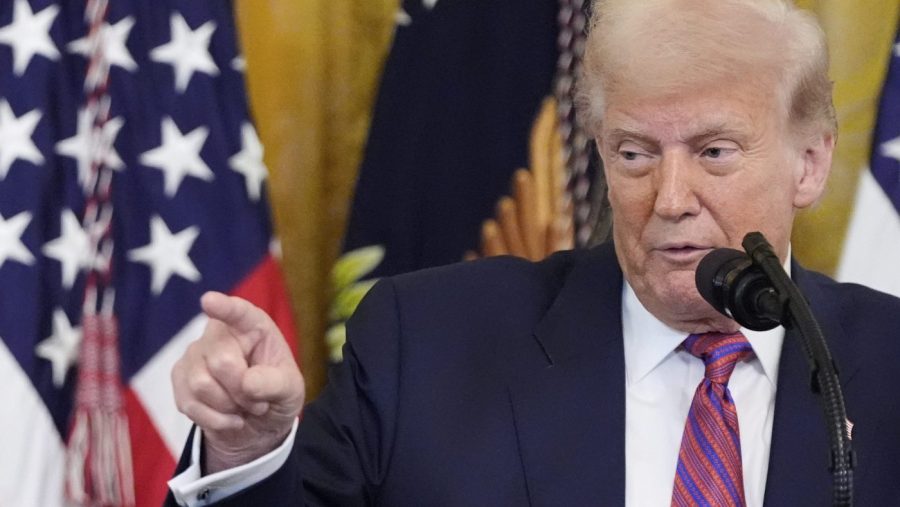President Donald Trump has solidified his status as one of the most powerful leaders in recent American history, exerting substantial influence over the Republican Party (GOP) and Congress. Six months into his second term, Trump’s ability to shape legislative outcomes and instill fear among party members has been evident, particularly as the midterm elections approach.
Trump’s legislative agenda has progressed at an unprecedented pace. His comprehensive domestic policy initiatives, branded as the “big, beautiful bill,” have faced little resistance, allowing for swift passage through Congress. According to the Brookings Institution, the Senate has confirmed 96 of Trump’s civilian nominees, achieving the fastest Cabinet appointments in two decades. The rate of confirmations during Trump’s first 100 days surpassed that of three of the last four administrations.
The former president’s influence has also been demonstrated in leadership elections. He played a crucial role in the ascension of Mike Johnson as Speaker of the House, applying pressure on key representatives such as Keith Self of Texas and Ralph Norman of South Carolina. Trump’s strategic maneuvering culminated in the passage of the first rescissions package since 1992, a feat he had previously attempted without success during his first term.
Despite some controversial actions, including a trade war with traditional allies and partnerships aimed at streamlining federal agencies, Republican lawmakers have largely refrained from challenging him. A senator who spoke on condition of anonymity highlighted the pervasive culture of fear in Congress, noting that Trump’s priorities are often treated as untouchable. “It’s sickening how we did not challenge,” the lawmaker remarked, referencing specific initiatives like the $40 million funding for the “Garden of Heroes.”
As Trump’s approval ratings have fluctuated, discontent has emerged among his core supporters, particularly regarding the handling of the Jeffrey Epstein files. Nonetheless, he faces minimal opposition within Congress. Stephen S. Smith, a political science professor at Washington University, remarked on Trump’s unique approach to governance, emphasizing his willingness to issue threats and promises of retribution against dissenters.
This atmosphere has led Republican lawmakers to align closely with Trump. Senator Tommy Tuberville of Alabama noted that Trump’s influence surpasses that of any president in recent history. He warned colleagues to either “get in line” or face potential primary challenges in the upcoming elections. Tuberville’s comments reflect a broader sentiment among Republicans, who recognize the consequences of opposing Trump’s agenda.
The swift passage of Trump’s initiatives, including the One Big, Beautiful Bill Act before the July 4, 2024 deadline he set, has surprised even seasoned lawmakers. Tuberville admitted he initially doubted the feasibility of such rapid progress, underscoring the effectiveness of Trump’s influence.
However, dissent does exist within the ranks. Senator Thom Tillis of North Carolina faced backlash after questioning aspects of Trump’s proposals. Following public criticism from Trump on social media platform Truth Social, Tillis decided not to seek reelection, demonstrating the potential repercussions for those who challenge the former president.
Republicans across Congress quickly approved Trump’s recent rescissions package after he threatened to withdraw endorsements from lawmakers who voted against it. Ross K. Baker, a professor at Rutgers University, suggested that Trump’s tactics may be reminiscent of Franklin D. Roosevelt, who similarly targeted dissenting party members. Baker explained that fear has become a significant motivator for Congressional compliance, as members worry about their constituents’ reactions to perceived disobedience.
Despite initial hesitations, Senate Republicans expedited the confirmation of Trump’s controversial nominees, including Pete Hegseth for the Department of Defense, Tulsi Gabbard for national intelligence, and Robert F. Kennedy Jr. for Health and Human Services. Even lawmakers who initially expressed concerns ultimately fell in line, illustrating the extensive reach of Trump’s influence.
The political landscape remains fluid as Trump continues to leverage his power heading into the midterm elections. As Republican lawmakers navigate their support for his agenda, the stakes are high for both the party and its leadership.





































































